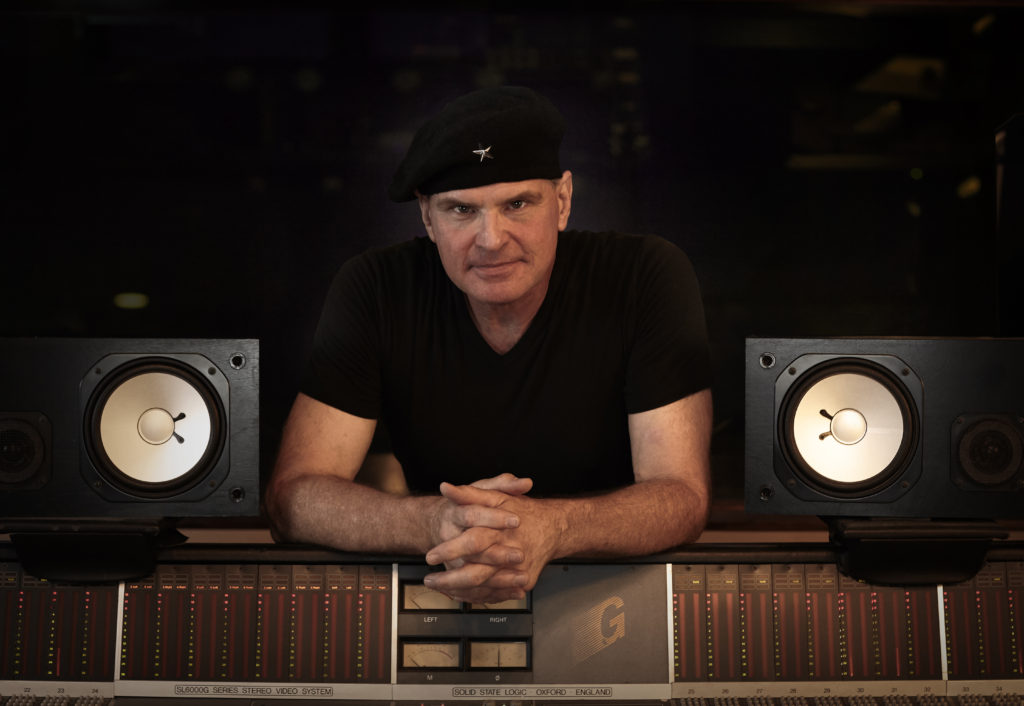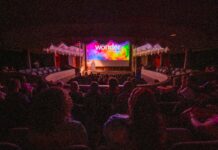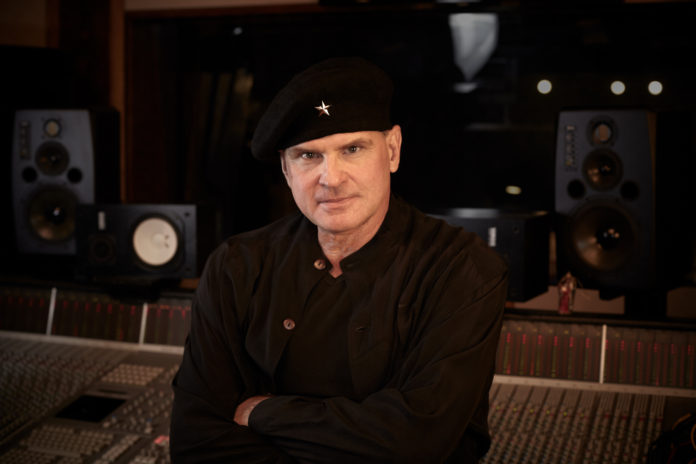
Dan Warren of Warren Media and Marketing sat down with David Prater for a recent interview.
When you have a beautiful wife, the brand-new home of your dreams and have conquered the musical landscape as a Multi-Platinum, Award winning Music Producer/Recording Engineer, why would you feel the need to plug back in? I sat down with Music Producer David “Darth” Prater and discussed his massive contributions to the music world and the musical climate before and during his departure.
DW: Greetings David, so why did you step away from the Music industry that you were so successful in?
DP: Phew, I’ll try and condense it as best I can, however, a lot happened. With the explosion of the Grunge movement in 1991, it was obvious to me that this was a social rebellion hellbent on delegitimizing all of the posturing and musical excesses of the 1980s. In 1977, I had been on a European tour as the drummer with former Labelle singer/songwriter Nona Hendryx opening for Peter Gabriel. While staying in London, I got to witness firsthand the raw excitement of the new “punk” scene at the Marque Club. Fast forward 15 years and Grunge felt like the same thing all over again. Out with the old, in with the new. Unfortunately, there were some unintended consequences no one saw coming. Case in point; Starting January 2, 1992, the music industry’s business model was soon to be rocked to its core with the development of the Internet and MP3. News traveled fast about kids on college campuses pirating huge volumes of CDs and phonograph records that had been converted into digital music files. With the click of a mouse, you could have all the music you wanted for free.
As an industry professional contracting my services to major labels, these new developments proved to be disastrous. Overnight, labels began purging their rosters of any rock acts remotely connected to bands from the 80s. Budgets for producers of new artist signings dried up completely. If all this wasn’t enough, the entire system of creating charts for the Top 200 was converted to a new accounting scheme called “Soundscan”. So literally overnight, Nirvana, Pearl Jam and Alice In Chains woke up to their records now in the Top Ten while the previous week’s top artists like Mariah Carey or Whitney Houston dropped precipitously. It was absolutely mind-blowing.
At this point, I took stock of my life and decided that I needed a break. Nothing made any sense anymore. For years I had been burning myself out making records back-to-back and was seriously exhausted. In the previous 18 months, I had produced three multi-platinum records for Firehouse (2) and Dream Theater (1). I was recognized by Billboard magazine as one of the Top 25 singles producers for 1991. So, now that I had money coming in from royalties, this seemed like a perfect time for a leave of absence.
DW: What did you do during that period in your life?
DP: Believe or not, in 1992, I moved to Austin, Texas and began playing competitive golf. As a kid growing up in Texas during the late sixties and early seventies, I had competed against grown men in club championships and later qualified for the Texas State Junior Open at 14. Now, I was eager to re-embrace the love of a game I played as a happy young boy. I just wanted to have fun again.
However, I didn’t withdraw from producing all together. Far from it. In 1995 I produced a 2nd album for Dream Theater, “Change of Seasons” and another one with Nightranger, “Feeding Off the Mojo”. The Nightranger record gave me a chance to work again with Don Grierson, my mentor at Epic Records. Sadly, he passed away January 19, 2019. In 2004 I discovered a band from Denison,TX, the “Texas Hippie Coalition”, and after several years of development released two successful records with them in 2008 and 2010 on CD Baby. From 2005-2007, I lived in Santiago, Chile off and on for the better part of a year. While there I produced two albums for Chilean artists “Fahrenheit” and “Six Magics”. In 2006 I spent one month in West Wales producing Welsh band “Lethargy” for Derek Oliver of Atco/East-West and Roadrunner Records fame. I was quite busy all along as it turns out…
DW: How does it feel to have music back on your radar?
DP: At the moment, I’m plugging back into an Industry that I love. I just completed a short media tour conducting multiple Interviews and participated on discussion panels at the 2019 Summer National Association of Music Merchants trade show, better known as NAMM and the Indie Entertainment Summit (IES) in Los Angeles. On my visits to Nashville and Los Angeles, I made the rounds and had a quick meet with Top Entertainment Industry Lawyer “Neville Johnson”, spent time with fellow panelists Producer Robert Margouleff (Stevie Wonder, Devo…); Recording Engineer Matt Forger (Michael Jackson, Quincy Jones…) and renowned Nashville mastering engineer Glenn Meadows. I had a blast meeting these guys, getting to know more about their background and of course exchanging war stories. They were very down-to-earth and easy to hang with. Also, I’m in talks with some new artists. There’ll be more to talk about soon.
DW: When did you start playing drums?
DP: I got my first drum kit when I was 12 years old. After growing up in Ft.Worth,TX, a city with a huge infatuation with the “British Invasion” and pop music, in 1966 my family moved to Temple, TX. The problem was, in Temple, there weren’t many kids my age interested in any kind of music, much less finding someone to play it with. So, from the time I was 12 to probably 18, I was on my own trying to find a direction. It was a miserable period in my life. Finally, in 1973 I went to a Frank Zappa Halloween concert at the Armadillo World Headquarters in Austin and that’s when everything went from Black & White to Technicolor. I got to meet Frank and go to his rehearsals during the day. From that point forward, I just went into an intense period of individual practice and wood shedding. I started learning more about how to play foreign time signatures and devise my own system of rudiments based upon what I had learned.
DW: How did you get the drumming gig with Santana?
DP: On the advice of a friend who was living there, in February 1976 I made the decision to move to San Francisco from Texas. I had zero interest in moving to Los Angeles or New York City. The thought of waking up in either one of those cities actually terrified me. After about six months into my time out there, I heard about an audition for Carlos Santana at S.I.R. rehearsal studios in San Francisco and somehow managed to weasel my way in. It’s crazy because technically speaking, it wasn’t even two years after high school. As fate would have it, I went to the audition with guns blazing and nailed it. At 20 years old, I was now a member of Santana. It was an out of body experience. Chronologically, I was a member of Santana #8 in between the albums “Amigos” and “Festival”. This was during an interesting period for Carlos because a few years after Woodstock he had taken a completely different direction. He really delved into a spiritual stream of consciousness kind of rock fusion, infused with Latin and jazz.
DW: What other artists have you toured with?
DP: After Santana, I got an offer to move to the East Coast and relocate in New York City. I toured with Labelle, Nona Hendryx, Nektar, Baby Grand, Sam Moore (Sam & Dave) and Brian Setzer. In 1982, during the tour of Japan I did with Sam, we played the Yokahama Stadium and Osaka Speed Boat Raceway. A live recording of those concerts was released later that year.
DW: How did you make the transition from Touring/Session Drummer to Music Producer?
DP: To be honest, I didn’t really have a choice. By 1983, I was flat busted. I couldn’t make rent or afford to buy food. None of the gigs I had up until then paid a living wage. I was desperate. People probably don’t remember it, but, after MTV came on the scene, it really affected the concert touring industry. Unless you were already plugged in with a touring clique, there were fewer and fewer tours going out where an artist needed new musicians. For instance, you stood zero chance of going out with Billy Idol or The Cars. Those group-members had been there for years. So instead, I threw myself into learning how to engineer and produce on a 4-track Tascam 244 tape-recorder I picked up in Tokyo’s Akihabara electronics district while on tour with Sam. Soon, I was able to make a decent living just recording in my basement and producing people’s demos. Around 1985/1986, New Jersey’s Glen Burtnik heard some of my work and was impressed with how I went about putting ideas together. He was signed to A&M Records and was about to record his first album, “Talking In Code”. We wrote a song together for that record and I played drums and sang background on the recorded version. By the time he was ready to begin sessions for the second record, he asked me to co-produce it with him. I was shock. That was the big break I had been waiting for. After the 2nd record entitled “Heroes & Zeroes” things began to snowball very quickly. I owe my career to Glen for what he did.
DW: What was the first big success that you had as a Music Producer?
DP: Without a doubt it was the 1990 debut of Firehouse. It went multi-platinum internationally, and the ballad “Love of a Lifetime” was played on every format in the United States, including weddings. On Billboard’s Top 200 singles charts, it got into the Top 5. Chart activity back then was totally different compared to now. There were no MP3s nor streaming services. The same for youtube. When I look at Billboard today, it’s like reading a Chinese translation of a computer software manual; it just doesn’t make sense to me. It used to be that when you opened up Billboard, you would immediately go to the ‘Hot 200’. It was kind of like a scoreboard for industry professionals. At the time, I had no idea that the album would be that well received. Almost a year after the record came out, Derek Oliver, a British friend and A&R rep at Atco/East-West, called me and said “You know Dave, I think that your Firehouse record’s really going to do something big, I really do”, and I thought; “Oh come on. I don’t believe you”, then he said; “No, really, I’m pretty sure it’s already platinum!” And sure enough, when I looked at Billboard, the ballad “Love of A Lifetime” had entered the top 5 in the latter part of 1990, and at that point, the people in front of us were Garth Brooks, Boyz II Men, Mariah Carey and Whitney Houston, and then FireHouse. So, when you get to that point, you suddenly realize; “Oh boy, we’ve done something here”.
DW: At the time, did FireHouse want to change their producer for the follow-up?
DP: Yes they did! They had to be talked back into it because the record company basically told them what they had to. Of course, I agreed to it even though I never knew there was a problem. Later, I learned they that they had an attorney insert a keynote clause that stated that I would not be compensated for any creative contributions I made to their music outside of the traditional role of a producer. But we went in, and it almost eclipsed the sales of the first record. However, in the United States, the producer is always in the hot seat and it is a razor’s edge to walk; it’s a high wire act with no net. Remember, this was during a period where producers were persona non grata to many groups. You were considered evil incarnate, and a lot of that was because of Mutt Lange and the way he would attach most of a group’s writing and publishing royalties. As a result, he became incredibly wealthy. Once the media got a hold of that story line, there was a lot of negative press coverage in the various rock periodicals telling musicians; “Whatever you do, don’t let your success be attributable to just the producer – change as soon as you can!”
DW: Tell us about the transitional period for Dream Theater on “Images and Words” and “A
Change of Seasons”
DP: Bear in mind, we are talking about two completely different organisms; the musical DNA between those albums was totally dissimilar. To begin with, keyboardist Kevin Moore quit during the making of Dream Theater’s 2nd album, “Alive”. Most people don’t realize that the reason the first record, “Images and Words” was successful, was due in large part to Kevin’s compositions and creative input into the Dream Theater sound. He’s really brilliant. Without question, he’s a student of songwriting in the traditional sense. He didn’t only listen to Fate’s Warning or Symphony X; he studied a wide pallet of material from a compositional perspective. As a result, on “Images and Words” there was a unique sense of musical texture, melodic structure, melodic phrasing, chord changes and so on. Working with the songs on that record was a joy because compositionally they took a listener somewhere. As a result, it was much easier for me to be able to craft the story line. When each composition ended, I tried to leave the listener with a crescendo: a climax. ‘Change of Seasons’ could not have been more different. First of all, it was 22mins, 5 seconds for one song. That would have been half of ‘Images and Words’ total running time. Regardless, I was deeply appreciative of being asked to produce it for them, however, after Kevin quit things just weren’t the same…
DW: With Grunge on the horizon, what was the atmosphere when you were producing Stephen Pearcy’s “Arcade” album?
DP: It was ominous and uncomfortable. It wasn’t just Grunge; it was also the Hip-Hop movement. I was doing Stephen’s record just after the L.A.Riots. When I got there, it was very obvious to me that the Sunset Strip era of all-white pretty-boy rock bands was over. As a result, you could cut the tension in the air with a knife. I had heard months earlier from Glen Burtnik after a conversation with Jon Bon Jovi where he told him; “You’re not going to believe what’s happening”. He said that bands like Cinderella, Ratt, Winger, Warrant and others of that ilk were being dropped even though their last had record sold well. I think the record companies saw the writing on the wall. Traditionally, after an artist has released an album that’s done well, if a major label’s going to pick up their option, they’re going to have to pay a lot of money to retain them. It was obvious back then that all the labels were cutting their losses. They knew that all the bands that had previously been strong earners soon wouldn’t be able to sell even a fraction of what they had before.
So, when I arrived in Los Angeles to begin Stephen Pearcy’s record it seemed pointless. Although Stephen and I got along great, there were agent provocateurs everywhere during the sessions. Still, I was recklessly determined to make the best record for Stephen that I could. Because we had worked so hard on the arrangements during pre-production, I knew that his material was really solid, but there were conflicts with some individuals within the band and his management that had nothing to do with making a great record. The quality of tracking for the rhythm section had been phenomenal. The rough mixes from each day’s work sounded better than many great records. Stephen and I were kicking butt, and I just thought; “man, this going to be a great record”. Unfortunately, I was asked to leave before I could put the finishing touches on the songs. There was just so much tension at that point in the Los Angeles music community. I was honestly relieved to get away from it. Still, in the end? If you go look up “Arcade” and Stephen Pearcy on you tube? The reviews are outstanding. Evidently, it still has something of a cult following. The Arcade record still holds water and looking back, I’m proud of it…
DW: How did you feel about the changes that Grunge brought?
DP: I totally supported them then and now. It was a breath of fresh air at a time when music had become far too ultra-formatted and commoditized. “Punk” had the exact same effect as “Grunge” but 15 years earlier. Musically? It was the equivalent of taking out the trash…
DW: What can we look forward to in the near future from Music Producer David Prater?
DP: At this stage of my life, I have a much clearer perspective on what I want to do and how I want to do it. My priorities could not be more different than they were back during the ‘80s and ‘90s. Back then, a producer was dependent on locking in lucrative production contracts even when you might not have heard the material. It was just, “Show me the money”. Thankfully, those days are gone forever. With the presence of major labels nowhere to be found, the whole concept of “making it” no longer resembles anything based in reality. Does that mean an artist must be an “instagram influencer” or a finalist on “The Voice”? Or better yet, maybe they need to have a talent for designing women’s shoes and cosmetics?
When I was a barely a teenager, in many ways Frank Zappa played a more constructive role in my life than my father. He was articulate, fearless and a certifiable genius. When I saw the cover of “Freak Out!” with the band name “The Mothers of Invention” I knew immediately what I wanted to pursue with my life: To be bold and creative no matter what the price. Thanks to Zappa, fifty some-odd years later that philosophy is still my Northstar…
David Prater is a Multi-Platinum, Award winning Music Producer/Recording Engineer, best known for his work with “Dream Theater”, Night Ranger, “Firehouse”, Stephen Pearcy’s “Arcade” and the “Texas Hippie Coalition”. As a session drummer, David has played and toured the world with the likes of Santana, LaBelle, Nona Hendrix, Baby Grand, Nektar, Sam & Dave and Brian Setzer.
The driving force behind Prater-Productions, David has been creating and producing music for well over 40 years. His work has received many awards, most notably the 1987 Academy Award “Song of the Year” for “Time of My Life” and the successful release of “Hungry Eyes” sung by Eric Carmen from the “Dirty Dancing” soundtrack. In 1991, with 4 Top Forty and Top Ten singles, Billboard Magazine named David Prater as one of the “Top 25 Pop Singles Producers” with 3 major chart singles, along with “Firehouse” winning the American Music Award’s “Best New Rock Artist”.
I had a great visit with David Prater for the interview-
Dan Warren, Warren Media and Marketing























